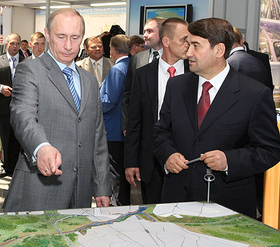
Major Overhaul of the North Caucasus’ Transit System is Postponed
Publication: Eurasia Daily Monitor Volume: 7 Issue: 153
By:

Russian Transportation Minister, Igor Levitin, toured the North Caucasian republics from July 31 to August 3. During that visit he announced several highway reconstruction projects, and unveiled plans for consolidation of the air transport industry in the North Caucasus. At the same time, however, he was extremely cautious about entertaining any groundbreaking transportation infrastructure development projects.
On August 3, at a regional meeting of transportation professionals, Levitin urged the regional authorities of the North Caucasus to consider creating a single air carrier that would be based in Mineralnye Vody (aka Minvody), which is located in the predominantly ethnic Russian populated region of Stavropol. According to the minister, Moscow would not be able to create an air carrier company in each territory of the North Caucasus. Levitin tried to reassure the republics that the flights from their airports would not be abolished. But he warned that the current situation –with the airports in the North Caucasus being so atypically close to each other, especially in comparison to the scarcely populated inner Russian territories– was unsustainable and should be optimized (www.mintrans.ru, August 3). This essentially means that some or all North Caucasian republican airports will become obsolete over time, as Moscow has decided to route the air traffic through the airport in Minvody.
Even though Levitin strived to appear as if he was open for discussion with the local authorities, Kommersant reported that a decision in principle was made to create a united air carrier for the North Caucasus Federal District under the auspices of Aeroflot. Moscow’s envoy to the North Caucasus Federal District, Aleksandr Khloponin, is reportedly pressing the government in Moscow to make Minvody a major regional transportation hub. Air transport analysts, however, caution that Aeroflot may have its own vision of the development of its regional network. The local air carrier based in Minvody is currently a federally owned company that ranks 23rd in size in Russia, having carried 238,000 passengers during the first six months of 2010, but it is losing its air traffic. Some observers say that unless Aeroflot invests in buying new aircraft, the Minvody project will not succeed (Kommersant, August 4).
The structure of the system of airports in the North Caucasus may be far from optimal, but the competing political interests of the regional elites are likely to thwart attempts to rid the republics of their airports. Dagestan, Chechnya, Ingushetia, North Ossetia and Kabardino-Balkaria each have their own civilian airport. Each of these airports only has a couple of regular daily flights. The road distance between the airport in Kabardino-Balkaria and North Ossetia is 100 kilometers (62 miles), the distance between North Ossetia’s airport and the airport in Ingushetia is 20 kilometers (12 miles), and only 85 kilometers (53 miles) separate Ingushetia’s airport from the airport in Grozny. Even the remotest airport in Dagestan is only 170 kilometers (106 miles) from Grozny’s airport.
Apart from the proximity of airports to each other in the North Caucasus, especially when compared to the average inner Russian territories, where the population density is much lower, no good reason was given for Moscow’s decision to concentrate air traffic in Minvody and not, for example, in Makhachkala or some other city of the North Caucasus that is closer to the Russian border than Minvody. The move may indicate Moscow’s desire to build a regional version of the notorious “power vertical” in the North Caucasus, with the most important pieces of infrastructure located safely in the Russian-speaking Stavropol region. This, in turn, is likely to provoke further resentment, even among the pro-Moscow elites of the North Caucasian republics.
Levitin announced his support for the idea for increasing from two to four the number of lanes on the Kavkaz highway, which cuts across the North Caucasus from northeast to southwest, from Rostov region to the border with Azerbaijan in Dagestan. The beginning of the project, however, has been delayed until 2013, which in the Russian reality means it may never materialize. Instead of allotting funds for the reconstruction of the airport in Ingushetia, Levitin said he “supported” the decision to provide $30 million for its reconstruction (www.mintrans.ru, August 2).
Throughout his visit to the North Caucasus Levitin repeatedly emphasized the need to enhance security measures in local transport. For example, he cited the need to use CCTV cameras, GLONASS navigation systems (the Russian equivalent of the GPS) and provide for the installation of effective control over intercity transit systems. Suicide attackers from Dagestan are believed to have travelled from Dagestan to Moscow by bus and blown up themselves in the metro on March 29.
At a conference of the United Russia party in Kislovodsk on July 6, Prime Minister, Vladimir Putin, promised an overhaul of the North Caucasus’ transit system as part of the massive government effort to accelerate regional development. According to Putin, all of the airports of the region would be rebuilt and the airports in Minvody, Magas (in Ingushetia) and Grozny would receive $16 million in 2010. Putin stated that the North Caucasus should become an integral part of the “North-South” transit corridor connecting Russia and Europe with the countries of the Persian Gulf and Central Asia. The Russian prime minister also referred to a specific transit project: building a highway across the Caucasus Mountains from Cherkess in Karachaevo-Cherkessia to the Black Sea coast in Abkhazia (www.premier.gov.ru, July 6).
Levitin’s visit to the North Caucasus, which was supposedly meant to add some flesh to the prime minister’s plans, did not live up to Putin’s grand vision. The transportation minister promised minimal investments in building highway bypasses for the big cities in the North Caucasus and a few other projects of local importance. He focused on what Moscow seems to be interested in above all –solidifying its grip over the most important pieces of infrastructure, more control over the transit systems and enhancing security. The project for a highway from Karachaevo-Cherkessia to Abkhazia received a fairly cool reception from Levitin, who said during his visit to Cherkessk that the project could be implemented only through a partnership between the government and private companies, which would envisage the construction of toll roads (www.mintrans.ru, August 3).




